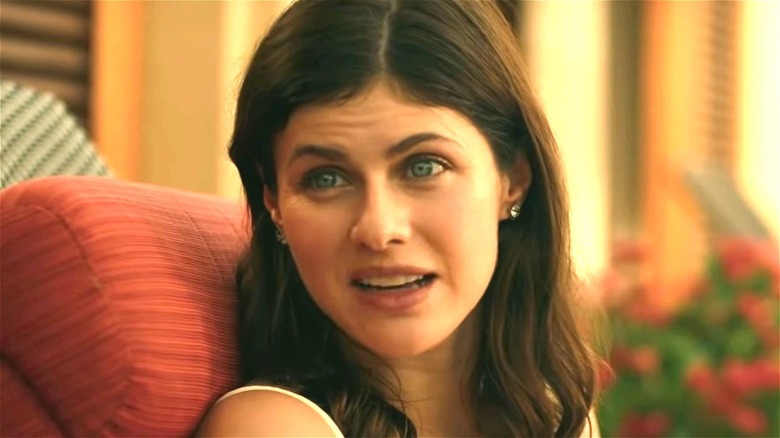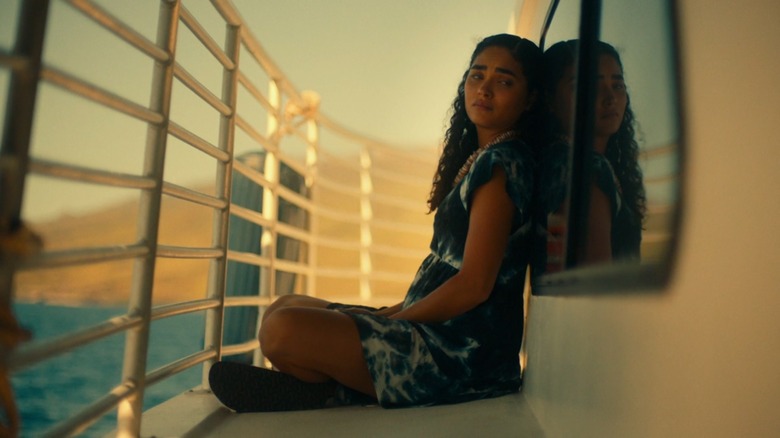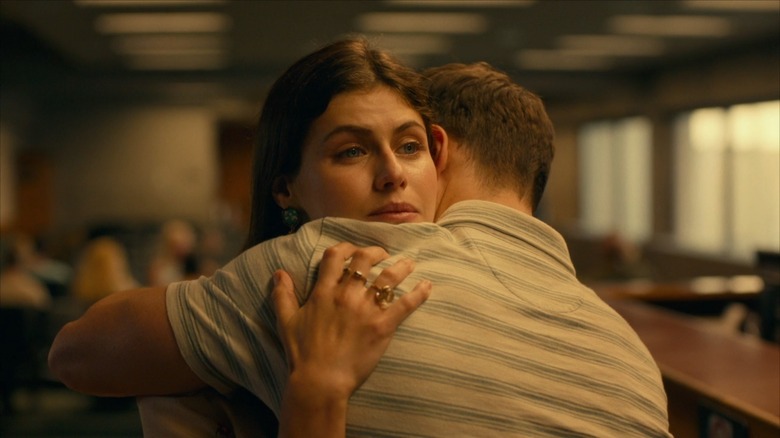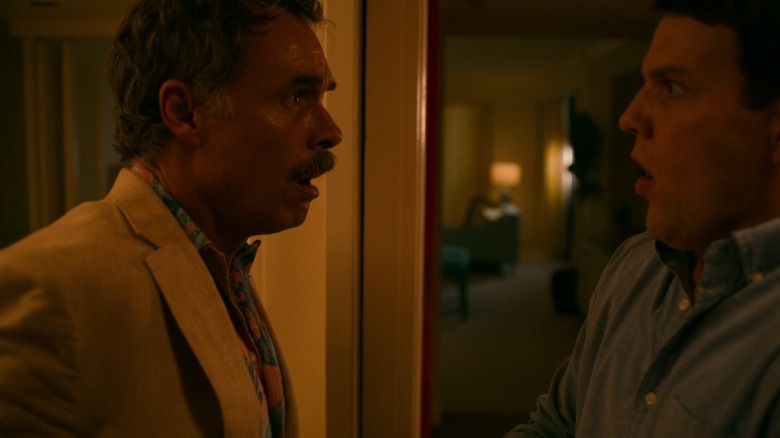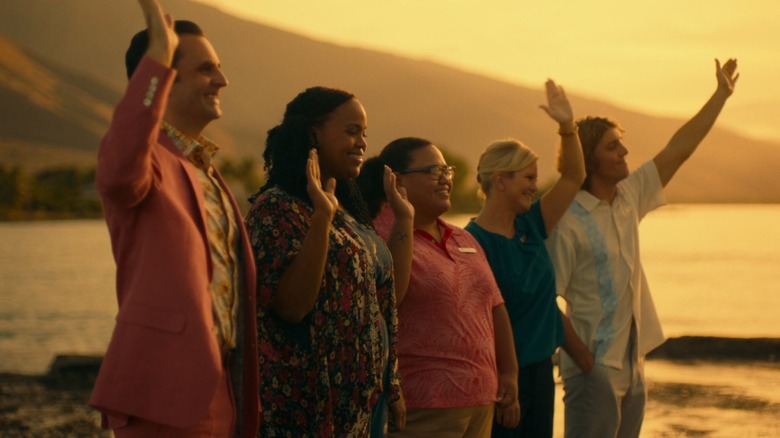The Ending Of The White Lotus Explained
August 15 was departure day for viewers of HBO's "The White Lotus." As the guests left the Hawaiian resort and returned to their regular lives, the rest of us got the opportunity to reflect on the rich socio-political messages of the series, as well as the shocking final episode.
The finale brought to a close the storylines of each of the central guests and the staff members unlucky enough to serve them. Leading up to the last episode, viewers were waiting to see whether grief-stricken Tanya McQuoid (Jennifer Coolidge) would follow through on her promise and go into business with accommodating spa manager Belinda (Natasha Rothwell). There was also tension brewing between the Mossbacher clan and their guest, Paula (Brittany O'Grady), who secretly helped her vacation sweetheart, a Native Hawaiian named Kai (Kekoa Scott Kekumano), steal the family's jewelry in a botched attempt to help him right the wrongs that had been done to his family by colonialism.
Meanwhile, the feud between entitled guest Shane Patton (Jake Lacy) and beleaguered resort manager Armond (Murray Bartlett) continued to heat up. Shane's new wife Rachel (Alexandra Daddario) had also begun to question if their recent wedding was a horrible mistake.
The very first scene of the series cryptically revealed to viewers that somebody would be leaving the White Lotus resort in a casket. So, who ended up passing away in paradise? And how do the conclusions of each storyline tie into the broader themes of the show? Let's unpack what went down during the finale of "The White Lotus."
Tanya lets Belinda down
When it comes time for Tanya to finally talk to Belinda about the possibility of funding the spa manager's wellness business, she has nothing but disappointing news. She explains to Belinda, "I realize I'm getting back into this pattern again, where I latch on to somebody and then I use my money to control them .... It's not healthy for me."
In nixing the business venture, a plan Tanya herself proposed in the first place, Tanya is revealing that her relationship with Belinda was entirely transactional. Tanya dangled the prospect of funding the wellness center over Belinda's head to keep her attention. Belinda, who often spoke to Tanya in overly enthusiastic tones, clearly also understood that to some degree. However, at the end of the day, Tanya is the one with money and Belinda is the one stuck entertaining the whims of the wealthy clients at the White Lotus Spa. To make things even worse, Tanya gives Belinda an envelope full of cash. It's not only a pathetic consolation prize but also a tacit admission from Tanya that she had indeed been using her money to control Belinda this whole time.
As is the case with many of the characters' endings, Tanya and Belinda's ultimate fates reflect a sense of injustice that's at the core of "The White Lotus." Emboldened by her new boyfriend's (Jon Gries) laissez faire attitude toward life itself, Tanya seems to have let go of the paralyzing indecision over what to do with her mother's ashes. In her final scene, we see her smiling and prancing in the surf as she throws them to the wind.
Belinda, in contrast, is last seen with a forced smile on her face as she greets a new boat full of guests arriving at the resort in a scene of "Groundhog's Day" style horror.
Paula is at odds with the Mossbachers
At the beginning of the season, the story of the Mossbacher family seemed like it was setting itself up to be a battle of the generations. College student Olivia Mossbacher (Sydney Sweeney) and her friend Paula spent much of the first few episodes sitting on the sidelines reading philosophy books and lobbing critiques at Olivia's parents and the rest of the privileged, white clientele at the White Lotus. However, when Paula pushes Kai to steal Nicole Mossbacher's (Connie Britton) jewelry, the real arc of their narrative comes into focus.
The aftermath of the robbery brings the constantly at-odds Mossbachers, Olivia included, closer together and widens the already visible cracks in Paula's relationship with the family. The more time Paula — the only non-white guest at the White Lotus the show focuses on — spends with the family the more she has come to realize that while Olivia may critique her parent's outdated attitudes in the abstract, she is a Mossbacher at heart.
When Olivia confronts Paula about her involvement in the theft, Paula says "And you think you're like this rebel but in the end, this is your tribe. Your family, the people here."
Olivia pushes back and calls Paula out for orchestrating the robbery. She points out that it could have gotten her mother seriously hurt and that it was wrong of her to steal their stuff. Olivia fires back, "Well, I guess it's not stealing when you think everything's already yours."
Here, Paula is referencing Olivia's status as a white woman vacationing on colonized land (more on that at the end). The same way Paula rolled her eyes at the way businesswoman Nicole deploys girlboss feminism to try and mask her retrograde capitalist leanings, she now sees Olivia's reading list of gender and race studies books as little more than her own method of deflection.
Shane doesn't realize that Rachel is at her wit's end
White Lotus guest Shane was at the center of two major conflicts. The first is one he's blissfully ignorant of until the season finale. His new wife Rachel, a struggling journalist who comes from a significantly more modest financial background, has come to the realization that she can't stay married to him.
Over the course of their honeymoon, Rachel has found herself having a difficult time finding common ground with her husband's general philosophy on life. She has a desire to advance her career and make a positive difference in the world. He, on the other hand, encourages her to give up her job now that she has married into wealth. There is also the issue of Shane's relationship to power dynamics. At the luxurious White Lotus, where the staff bends over backward to cater to their guests, Shane goes to extreme lengths to make sure he's getting the most out of what he believes he's owed. When an error results in them getting a different, but just as nice, room than what they booked, he hounds the resort manager about it for their entire honeymoon, not content to accept an apology for the simple mistake. Rachel continuously encourages him to let the feud go but Shane refuses.
Ultimately, though, Rachel ends up staying with Shane. She spends much of the finale quietly sobbing with a blank look on her face that seems to indicate that she doesn't know how to get out of the mess she's found herself in. When we see her hug Shane and promise him that she'll be happy during their final scene, her face betrays the fact that this decision is likely her kicking the proverbial can down the road, rather than an earnest attempt to make their relationship work.
Armond pays the ultimate price
Shane's other conflict is with the White Lotus' manager, Armond. After experiencing a relapse of his sobriety midway through the season, Armond has been struggling to navigate a variety of tricky workplace situations. His conflict with Shane over the room debacle boils over into a multi-faceted feud. When Shane hounds Armond about the room, Armond finds ways to get petty revenge and then cover his tracks. In the finale, though, he's run out of road, as Shane has used his connections to track down Armond's boss to file an official complaint about his behavior. When Armond gets called in for a meeting with the resort's owner, he sees the writing on the wall.
Although he'd previously expressed his intention to get back on track with his sobriety, Armond decides to spend what he believes is his final night working at the hotel on an alcohol and drug-fueled bender. He also decides to give Shane one last parting shot. After using his master key to enter the newlywed's room, Armond defecates in Shane's suitcase, only to hear the sound of Shane letting himself in soon after.
Earlier in the episode, it was established that Shane is hyper-aware of security following the Mossbacher's robbery. When Shane hears Armond trying to sneak out, he believes the robber has targeted his own room and stabs the intruder. It's not until after delivering a fatal blow that he realizes it's Armond. Considering how much Armond resented the privileged guests he served at the resort, the irony of him being killed by one of them while on the job is one of the show's darkest moments.
Colonialism is alive and well at the White Lotus
The Hawaiian setting of "The White Lotus" provided the show not just with a picturesque backdrop but also a scathing critique of American colonialism. Hawaii was, after all, an independent kingdom before it was subsumed into the United State's colonial empire.
The story of Paula and Kai is a clear example of this. Paula convinced Kai to steal the Mossbacher's jewelry after he told her that when the resort was built the government illegally confiscated lands owned by Kai's family. She wanted him to have the money so he could afford a lawyer who could help him fight back. But "The White Lotus" is not a show where deserving characters get their happy endings. Ultimately, Kai gets caught, the jewelry is returned, and more guests flood into the resort to enjoy their vacations on the stolen land while watching Native Hawaiians dance for their entertainment.
Paula's stark turn toward quiet, seething rage in the latter part of the show reflects her new first-hand experience at just how dehumanizing and demoralizing the modern-day legacy of colonialism really is. She also gets a perfect encapsulation of how little people like the Mossbachers actually care when it comes to the prospect of making even the smallest personal sacrifices to do something about it. At breakfast one morning, Mark Mossbacher (Steve Zahn) says dismissively about the issue, "Should we give away all our money? ... Maybe we should just feel s—ty about ourselves all the time for the crimes of the past? Wear a hair shirt and not go on vacation?"
It's a sentiment no doubt shared by most of the guests at the White Lotus. And although Mark talks about the crimes of imperialism as being in the "past," the way the mostly white guests interact with the stolen land they are vacationing on proves that colonialism is still very alive.
